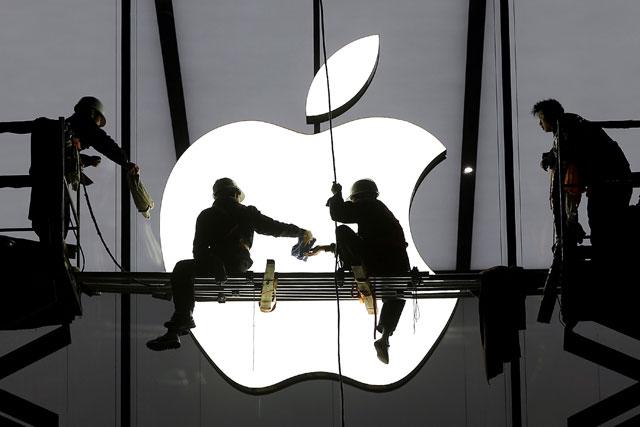You are here
Forget the watch: Apple’s iPhones are still the main event
By AP - Apr 28,2015 - Last updated at Apr 28,2015
SAN FRANCISCO — The iPhone is still the engine behind Apple’s phenomenal success, even if attention lately has been focused on its new smartwatch.
While sceptics question whether the company’s future is tied too much to one product, the iPhone’s popularity was the reason Apple turned in another blow-out financial report Monday. The results far surpassed most analysts’ expectations for the first three months of the year, when sales traditionally fall from their holiday-season peak.
Apple sold more than 61 million iPhones in the quarter, accounting for more than two-thirds of its $58 billion in revenue for the three-month period and the lion’s share of its $13.6 billion in profit.
As expected, the numbers were down from the previous quarter, when holiday shoppers bought a record 74 million of Apple’s new iPhone 6, 6 Plus and older models. But the 61 million was a 40 per cent increase over the number of iPhones sold in the first three months of 2014.
“We’re seeing great results all over the world,” Apple Chief Financial Officer Luca Maestri told The Associated Press, adding that iPhone sales grew 72 per cent in China, where the company has big hopes for expansion.
Other products played a much smaller role. Revenue from Mac computers rose 2 per cent from a year earlier, to $5.6 billion, while iPad revenue fell 29 per cent, to $5.4 billion — continuing a steady decline in tablet sales.
Apple didn’t report any results for the new Apple Watch, which it began selling this month after the quarter ended. CEO Tim Cook told analysts on a conference call that he was “thrilled” with customer response, but added that it’s difficult to gauge demand because initial supplies are limited. Analysts estimate about 2 million have sold to date, suggesting early demand is healthy but not of blockbuster proportions.
The iPhone is another story. Since it began offering models with bigger screens last fall, Apple has vied with South Korea’s Samsung for the No. 1 position in the global smartphone market. By some estimates, Apple outsold Samsung in the quarter that ended in December, and analysts will be watching closely when Samsung reports its latest results this week.
As iPhone sales have surged, so has Apple’s stock. Apple shares have gained more than 50 per cent over the last year, making it the world’s most valuable company. The stock closed Monday at $132.65, up 1.8 per cent for the day, and was rising another 1 per cent in extended trading.
The iPhone isn’t just Apple’s dominant product, said Frank Gillett, a tech industry analyst at Forrester Research. “It’s more than anything else what’s driving the success of their company.”
Market researchers, however, expect smartphone growth to slow down worldwide this year, particularly at the higher price range where Apple competes, as most consumers in industrialized countries have already bought one. That could make it difficult for Apple to maintain its recent pace.
“They’re extremely dependent on the iPhone,” said investment analyst Colin Gillis at BGC Partners. “At some point, the market dynamics change,” he said, adding that the question is what could replace the iPhone if sales begin to slow.
Cook said he’s optimistic about new markets such as China, where Apple has made a strong showing against Samsung and China’s Xiaomi by appealing to a growing middle class. He also said only 20 per cent of iPhone owners have purchased the newest models, which he painted as a sign that many more will eventually upgrade to the 6 or 6 Plus.
Maestri, meanwhile, said the company is diversifying with new products like Apple Watch and Apple Pay, which on Monday added Discover to the list of payment cards that work with the service. While he acknowledged these currently provide minimal revenue to Apple, analysts say they have big potential. And they are designed to work closely with the iPhone, which means each may bolster the other’s popularity in the future, Gillett said.
Apple also announced Monday an expansion of its 2-year-old effort to give investors a bigger share of the company’s huge profits. Maestri said Apple will raise its quarterly dividend by 11 per cent, to 52 cents a share, and has increased a $90 billion stock buyback programme to $140 billion. In total, he said the programme will return $200 billion to investors by the end of March 2017.
Apple ended the quarter with $193.5 billion in cash and short-term securities. But since most of that is parked overseas to avoid paying higher US tax rates, Maestri said Apple will likely take advantage of low interest rates to borrow money for the programme.
Related Articles
Apple CEO Tim Cook says consumer demand for new iPhones has been "staggering" and "hard to comprehend”. That helped the company report record-smashing earnings for its latest quarter and primed its stock for a rally Wednesday.
SAN FRANCISCO – Apple's latest quarterly profit leapt as people around the world snapped up big-screen iPhones but its shares slipped as ana
SAN FRANCISCO — Apple could soon face one of its biggest challenges to date: Peak iPhone.Most analysts believe Apple surpassed its own recor

















